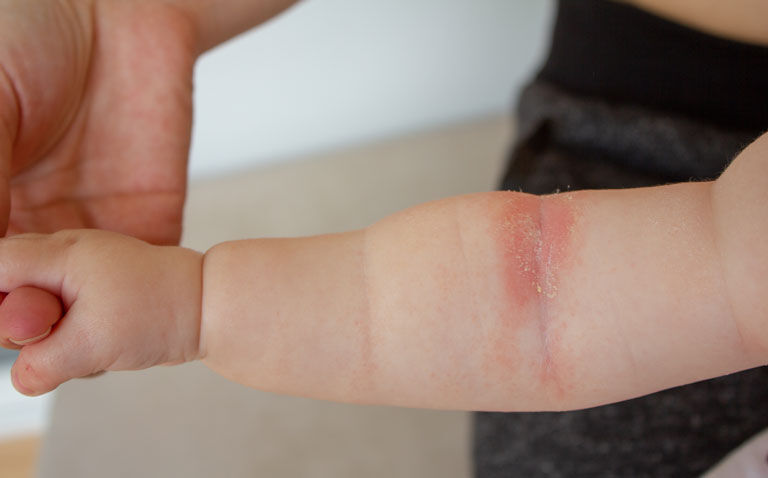An RCT has found that dupilumab improves the signs and symptoms of atopic eczema in children aged 6 years and under
Although dupilumab is licensed for moderate to severe atopic eczema from 6 years of age, the drug also appears to be effective in children under 6 years of age according to the findings of a randomised, double-blind, placebo-controlled trial by US researchers.
Atopic eczema is a common childhood condition with a global real-world prevalence study in the paediatric population finding that the 12-month prevalence ranged from 2.7% to 20.1% across countries but that severe disease was generally less than 15%. Dupilumab is a human monoclonal antibody against the interleukin-4 receptor alpha, inhibiting the signalling of interleukin-4 and interleukin-13. The drug has been shown to be effective for adults with moderate to severe disease.
For example, in two identical randomised, placebo-controlled trials, where the primary outcome was the proportion of achieving a score of 0 or 1 (clear or almost clear) on the Investigator’s Global Assessment and a reduction of 2 points or more in their score from baseline at week 16, this occurred in 36% of those who received dupilumab every other week and in 36% who received dupilumab weekly.
As mentioned earlier, whilst licensed from age 6, to date, there is limited data on the effectiveness in children under 6 years of age apart from one phase 2, open-label study, which found that a single-dose dupilumab was generally well tolerated and substantially reduced clinical signs/symptoms of eczema.
The present study was the first, large scale, randomised, placebo-controlled trial of dupilumab in children as young as 6 months old. The US team recruited children aged 6 months to under 6 years with moderate to severe atopic eczema (investigator’s Global assessment, IGA score of 3 – 4) with an inadequate response to topical corticosteroids. These children were then randomised 1:1 to either subcutaneous placebo or dupilumab 200 mg (body weight > 5 kg to < 15 kg) or 300 mg (> 15 kg but less than 30 kg) every 4 weeks in addition to a low-potency topical corticosteroid (hydrocortisone acetate 1%) for a total of 16 weeks.
The primary endpoint at week 16 was the proportion of patients who achieved an IGA score of 0 or 1 (indicating that their skin was either clear or almost clear). For the secondary endpoint, the team assessed the proportion achieving an EASI75, i.e., a 75% improvement in their eczema area and severity index also at week 16.
Dupilumab and improvement in disease severity
A total of 162 children with a mean age of 4 years (61% male) were randomised to dupilumab (83) or placebo. Among those assigned to dupilumab, 76% had an IGA score of 4 and both groups received hydrocortisone.
At week 16, a significantly higher proportion of patients taking dupilumab achieved the primary outcome (28% vs 4%, p < 0.0001) and this also occurred for the secondary endpoint of an EASI75 (53% vs 11%, p < 0.0001).
A similar proportion of patients had at > 1 treatment-emergent adverse event (64% vs 74%, dupilumab vs placebo).
The authors concluded that dupilumab with concomitant low potency topical steroids significantly improved disease severity compared to placebo in children under 6 years of age and that the drug was well tolerated.
Citation
Paller AS et al. Dupilumab in children aged 6 months to younger than 6 years with uncontrolled atopic dermatitis: a randomised, double-blind, placebo-controlled, phase 3 trial Lancet 2022










